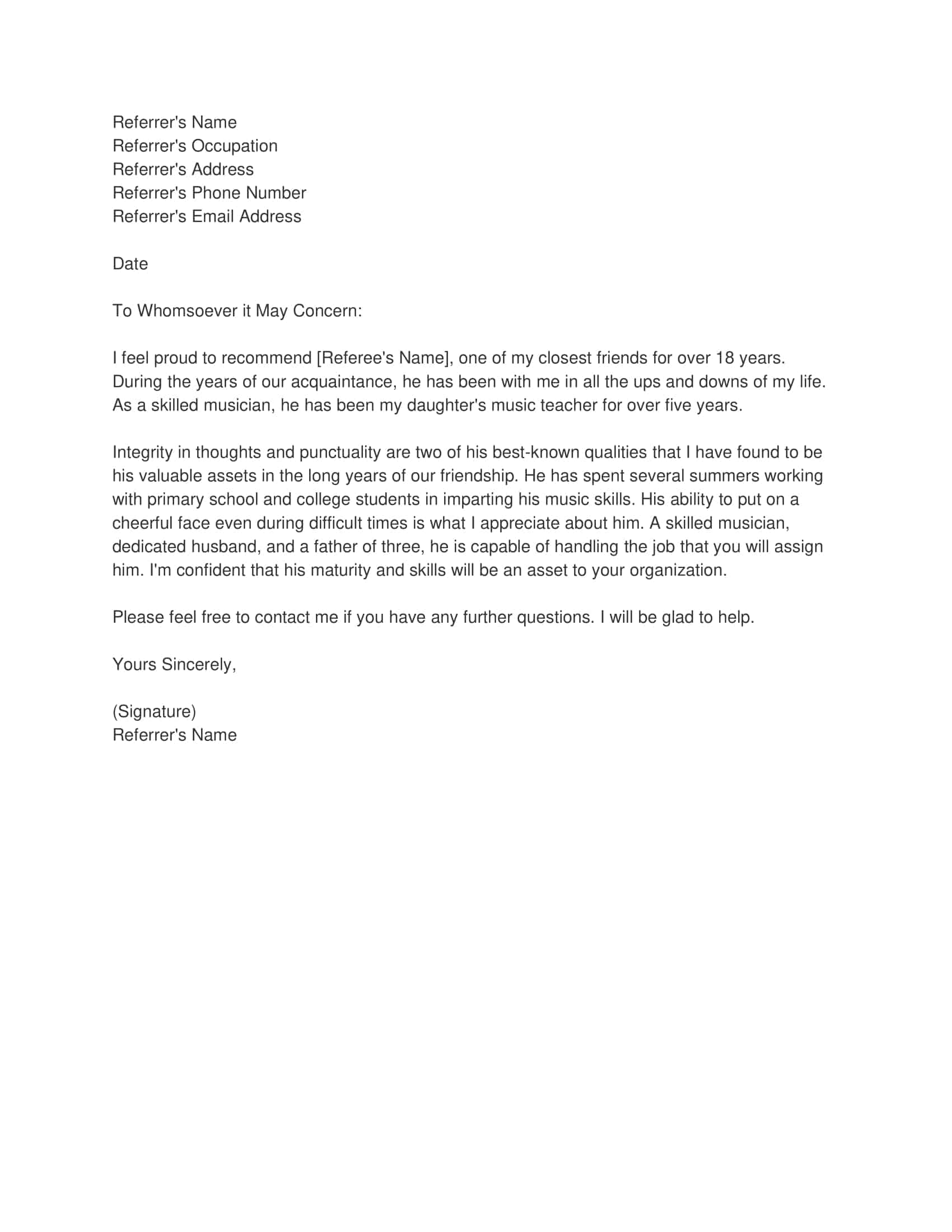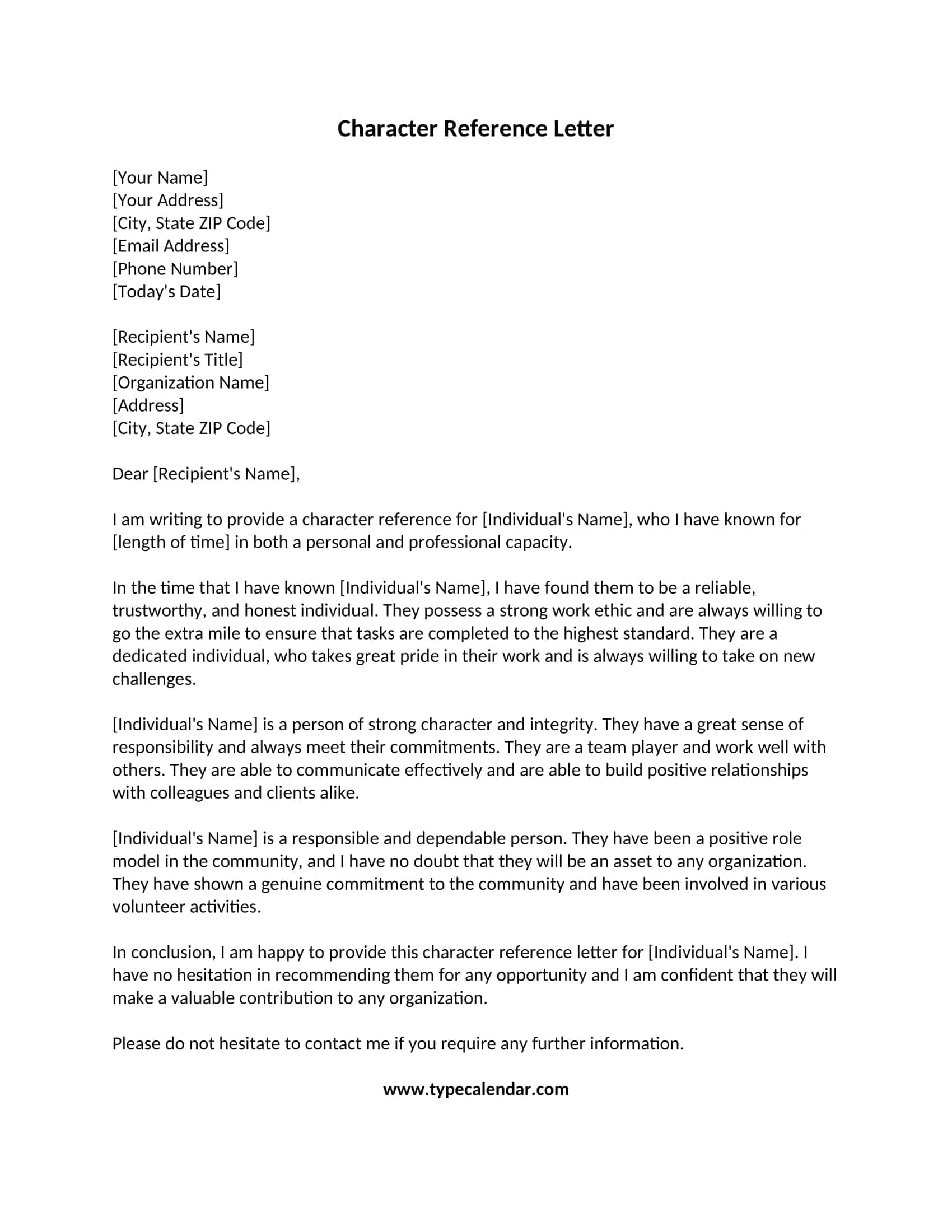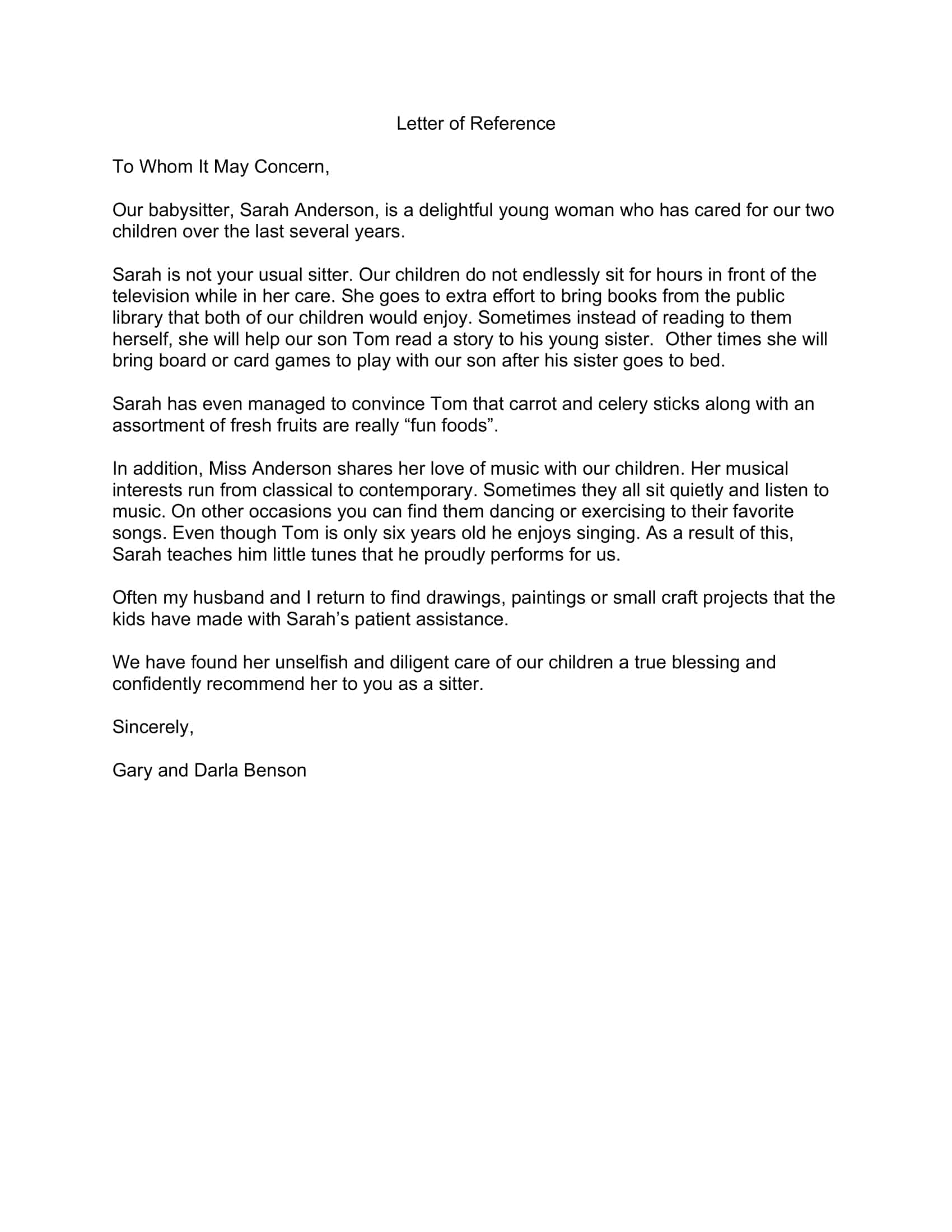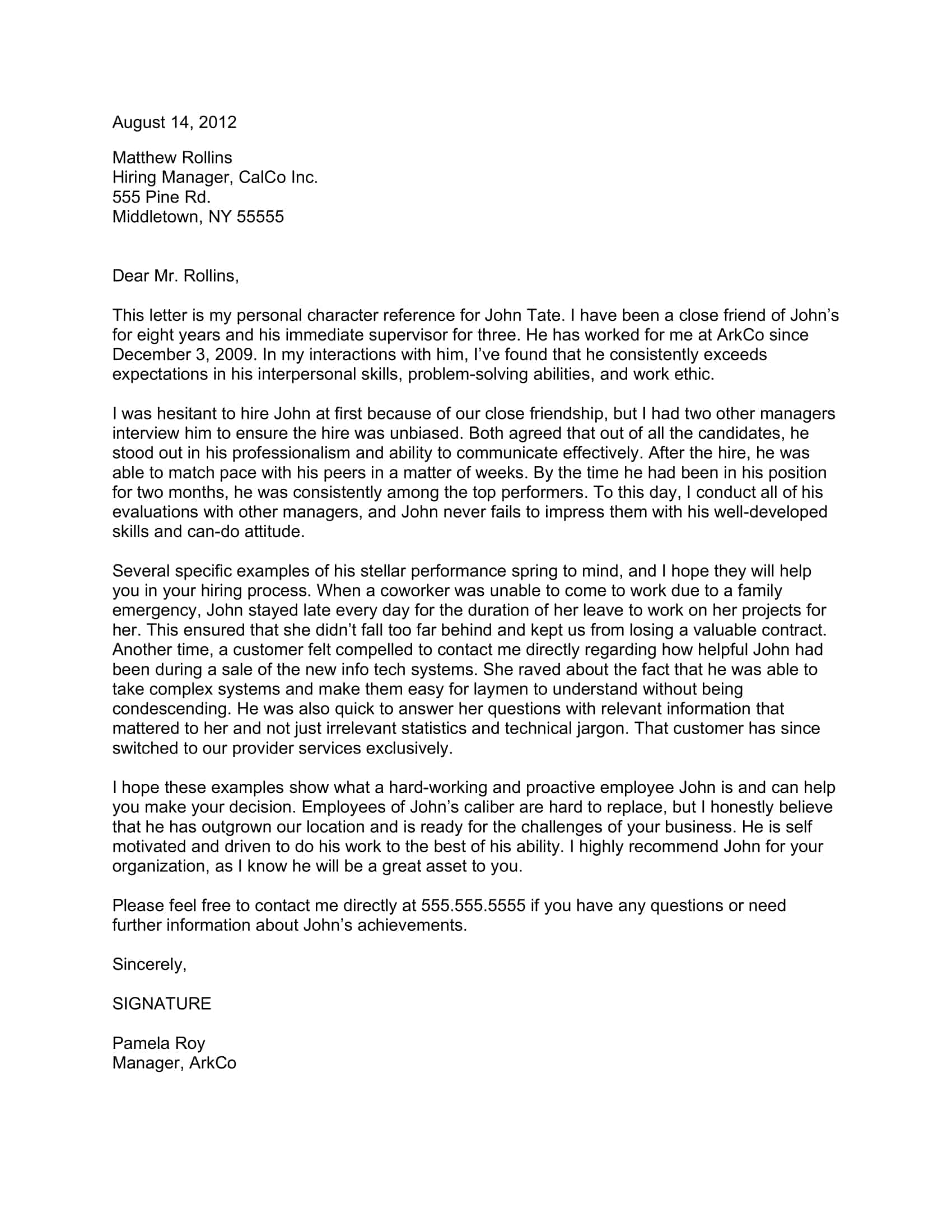There comes a time in your life when you may be asked to compose a recommendation letter for someone. This might be a letter of endorsement for a friend, former coworker, or a pupil at your educational facility. Occasionally, it could involve a family member or an intimate acquaintance.
The character of the recommendation letter plays a crucial role in shaping the outcome of the decision made by the person or institution receiving it. Such letters can either pave the way for opportunities and accolades or, if poorly crafted, can hinder an individual’s prospects. This website acknowledges the importance of recommendation letters, and by utilizing our reference letter templates, you can ensure that you are on the path to success.
Table of Contents
Personal / Character Reference Letter Templates
“Personal/Character Reference Letter Templates” are pre-designed documents that provide a structured framework for individuals to create personalized letters that vouch for the character, skills, and qualities of another person. These templates serve as valuable tools to support individuals in writing compelling reference letters for various purposes, such as job applications, academic admissions, or personal endorsements.
Personal/character reference letters are written by someone who knows the individual well and can provide insight into their character, abilities, and personal attributes. These letters help potential employers, academic institutions, or organizations gain a deeper understanding of an applicant’s qualities beyond what is reflected in their resume or academic records.
Personal/character reference letter templates typically include sections to introduce the writer, establish their relationship with the person being referred to, and provide specific examples or anecdotes that highlight the individual’s strengths, work ethic, integrity, or other relevant attributes. The templates also guide the writer in expressing their confidence and recommendation for the person’s suitability for the opportunity or role.
What is a Personal / Character Reference Letter ?

A Personal or Character Reference Letter is a document written by someone who knows the subject well, typically outside of a professional setting, to vouch for the individual’s character, personal qualities, and values. This type of letter is often used for various purposes, such as job applications, college admissions, scholarships, or even legal matters.
The writer of the letter, known as the referee, is usually someone who has a close relationship with the subject, such as a friend, family member, coach, mentor, or community leader. In the letter, the referee provides specific examples and anecdotes to illustrate the subject’s positive traits, emphasizing their suitability for the opportunity in question. Character reference letters can help decision-makers gain a better understanding of the individual’s personality, reliability, and moral compass, which may not be apparent in a professional reference letter or resume.
What to Include in a Personal Reference Letter
When writing a personal reference letter, it is essential to include specific information that highlights the individual’s character, values, and personal attributes. Here are some key elements to include in a detailed personal reference letter:
Contact information: Start the letter by including your contact information (name, address, phone number, and email address) at the top of the page, followed by the date, and then the recipient’s contact information (if available).
Salutation: If you know the recipient’s name, use a formal salutation, such as “Dear [Recipient’s Name].” If the recipient’s name is unknown, use a general salutation like “To Whom It May Concern.”
Introduction: Begin the letter by introducing yourself, your relationship with the person you are recommending, and the duration you have known them. Explain why you are qualified to provide a character reference for the individual.
Description of personal qualities: Provide a detailed description of the individual’s positive character traits, values, and personal attributes. Some examples might include their honesty, integrity, responsibility, work ethic, adaptability, kindness, or leadership skills. Use specific examples and anecdotes to illustrate these qualities, demonstrating how they have been exhibited in various situations.
Context for the reference: Explain the purpose of the reference letter and how the individual’s qualities make them a suitable candidate for the opportunity in question, be it a job, college admission, scholarship, or any other purpose.
Comparison to others: If applicable, compare the individual to others in a similar context to emphasize their strengths and why they stand out among their peers.
Offer to provide further information: Include a statement expressing your willingness to provide additional information if required. This demonstrates your confidence in the person you are recommending and your commitment to helping them succeed.
Closing: Close the letter with a formal closing, such as “Sincerely” or “Yours truly,” followed by your full name and signature (if sending a hard copy).
Proofread: Before submitting the letter, thoroughly proofread it for grammar, spelling, and punctuation errors, ensuring that it is well-organized and coherent.
Who is qualified to write a reference letter in various situations?
When asked to compose a reference letter for someone, it is crucial to evaluate the circumstances and determine if you are legally and ethically able to do so, in order to prevent potential legal complications. As a reference letter is an official document, it is important to ensure that the content is truthful and accurate to avoid legal repercussions. There are specific criteria and guidelines one should adhere to before proceeding with writing a reference letter. These essential factors include:
The subject of the reference letter should be someone you are well-acquainted with, either through personal interactions, as is the case for a character reference letter for a friend, or through existing records within your educational or professional institution. An example of an inappropriate reference letter author would be a professor writing a letter for a student who rarely attends their lectures.
You should have a relationship with the person in question that grants you the necessary knowledge and insight to create a meaningful reference letter. This might apply to someone who has collaborated with the candidate for an extended period, as they would possess reliable and significant information about the individual that a prospective employer or institution can rely upon.
You must be capable of delivering an honest and positive reference letter. If you cannot provide a favorable recommendation or have personal conflicts with the subject, it is best to decline writing the reference letter. Instead, suggest they seek someone else who can write a more suitable and supportive letter on their behalf.
Essential aspects to understand about a character reference letter:
The ideal situation for writing a character reference letter arises when an individual’s personal qualities, rather than their professional skills, are being evaluated. This is often the case for volunteer work applications, membership qualifications for clubs, or private societies.
There are certain guidelines to follow when composing reference letters:
Maintain a positive tone throughout the letter. If you feel you cannot achieve this, it is better to decline writing the letter.
When someone asks you to write a character reference letter for them, inquire if they would like a sample to guide your writing. Crafting a character reference letter can be challenging, and a sample can provide useful direction. This website offers character reference letter samples to facilitate the writing process or to give you an idea of how to approach it.
In instances where a character reference letter is required for court proceedings, the author of the letter may need to appear in court to testify as a witness. Therefore, the writer should be comfortable with the prospect of appearing before a judge.
Writing a reference letter carries significant responsibility, as the recipient’s decision about the individual will be partly influenced by the content of the letter. This website provides valuable information, guidance, and sample reference letters, along with reference letter templates to assist you in the process.
Tips for Writing a Personal Reference Letter
When writing a personal reference letter, it is important to keep certain tips in mind to ensure that the letter is effective, professional, and persuasive. Here are some tips for composing a strong personal reference letter:
Know your subject: Be familiar with the person you are writing the reference letter for, as well as their personal qualities, values, and accomplishments. This will allow you to provide specific examples and anecdotes that illustrate their strengths.
Start with an introduction: Begin the letter by introducing yourself, your relationship to the subject, and how long you have known them. This establishes your credibility as a referee.
Focus on the individual’s character: Emphasize the personal traits and qualities that make the individual stand out. Include specific examples of how they have demonstrated these qualities in various situations.
Be relevant: Tailor the letter to the specific opportunity the individual is pursuing. Address how their qualities make them a good fit for the role, program, or organization in question.
Be concise and organized: Keep the letter focused and well-structured. Limit the length to one page, if possible, and ensure that each paragraph serves a specific purpose.
Use a positive tone: Highlight the individual’s strengths and achievements, while maintaining an honest and positive tone throughout the letter.
Proofread: Thoroughly review the letter for spelling, grammar, and punctuation errors. A well-written letter demonstrates professionalism and attention to detail.
Offer additional information: Express your willingness to provide further information, if needed, and include your contact details to facilitate any follow-up communication.
Use a formal closing: End the letter with a professional closing, such as “Sincerely” or “Yours truly,” followed by your name and signature (if sending a hard copy).
How To Write a Personal Reference Letter
Writing a personal reference letter involves several key steps to ensure it is well-structured, persuasive, and professional. Follow this step-by-step guide to create an effective personal reference letter:
Step 1: Gather information
Before you begin writing, gather information about the person you’re recommending, the purpose of the letter, and the specific opportunity or organization they are pursuing. This will help you tailor the content to the recipient’s requirements.
Step 2: Begin with contact information and salutation
At the top of the page, include your contact information (name, address, phone number, and email address). Write the date below your contact information, followed by the recipient’s contact information (if available). Start the letter with a formal salutation, such as “Dear [Recipient’s Name]” or “To Whom It May Concern.”
Step 3: Introduce yourself and your relationship
In the opening paragraph, introduce yourself, explain your relationship to the person you’re recommending, and specify how long you have known them. This establishes your credibility as a referee.
Example: “My name is Jane Smith, and I have had the pleasure of knowing John Doe for the past five years through our mutual involvement in the local community theater.”
Step 4: Describe the individual’s character
In the body of the letter, focus on the person’s personal qualities, values, and character traits. Use specific examples and anecdotes to illustrate how they have demonstrated these qualities in various situations.
Example: “John has consistently exhibited a strong work ethic and commitment to the success of our productions. He frequently volunteers for additional responsibilities and is always willing to lend a helping hand to his fellow cast members.”
Step 5: Explain their relevance to the opportunity
Tailor the letter to the specific opportunity the individual is pursuing. Address how their personal qualities make them a suitable candidate for the role, program, or organization in question.
Example: “I firmly believe that John’s dedication, team spirit, and passion for theater make him an excellent candidate for your prestigious theater program.”
Step 6: Offer additional information
Express your willingness to provide further information or clarification, if necessary. Include your contact details to facilitate any follow-up communication.
Example: “If you have any further questions or require additional information, please do not hesitate to contact me at [phone number] or [email address].”
Step 7: Conclude the letter
End the letter with a closing statement that reinforces your recommendation, followed by a formal closing, your full name, and your signature (if sending a hard copy).
Example: “In conclusion, I wholeheartedly recommend John Doe for your theater program, as I am confident that his talent and dedication will greatly contribute to its success. Sincerely, Jane Smith.”
Step 8: Proofread
Thoroughly proofread the letter for spelling, grammar, and punctuation errors. A well-written letter demonstrates professionalism and attention to detail.
Character Reference Letter Template (Text Version)
(Your Name)
(Your Address)
(City, State, Zip Code)
(Your Email Address)
(Your Phone Number)
(Date)
(Recipient’s Name)
(Recipient’s Title)
(Recipient’s Organization)
(Recipient’s Address)
(City, State, Zip Code)
Dear [Recipient’s Name],
I am writing to wholeheartedly recommend [Candidate’s Name] for [purpose of the letter, e.g., college admission, job position, volunteer program]. My name is [Your Name], and I have known [Candidate’s Name] for the past [number of years] years as a close [friend/neighbor/mentor/coach]. During this time, I have had the pleasure of witnessing [Candidate’s Name] grow and develop as an individual, and I am confident in their ability to succeed in [specific opportunity].
[Candidate’s Name] has consistently demonstrated strong [mention key character traits, e.g., leadership, teamwork, responsibility, and dedication] throughout our relationship. For example, [provide a specific anecdote or example that highlights the mentioned character traits, e.g., their role as a volunteer at a local food bank or their involvement in organizing community events].
In addition to their admirable character, [Candidate’s Name] has shown great [mention other personal qualities relevant to the opportunity, e.g., adaptability, resilience, or problem-solving skills]. [Provide another anecdote or example that showcases these qualities, e.g., how they handled a challenging situation or contributed to a group project].
I am confident that [Candidate’s Name] will be an excellent fit for [specific opportunity] and will make a valuable contribution to your [organization/institution/program]. Their [mention key character traits and qualities again, e.g., strong leadership skills, commitment to teamwork, and dedication to community service] make them an ideal candidate for this opportunity.
Should you require any additional information or clarification, please do not hesitate to contact me at [Your Phone Number] or [Your Email Address]. I would be more than happy to provide further details about [Candidate’s Name] and their qualifications.
In conclusion, I wholeheartedly recommend [Candidate’s Name] for [specific opportunity] and believe that their unique skills, character, and dedication will be an asset to your [organization/institution/program]. Thank you for considering my recommendation.
Sincerely,
(Your Name)
FAQs
When is a personal reference letter needed?
Personal reference letters are often required for applications to colleges, scholarships, volunteer programs, clubs, or organizations where an individual’s character and personal qualities are considered important factors in the selection process.
Who should write a personal reference letter?
Personal reference letters should be written by someone who knows the subject well and can attest to their character, values, and accomplishments. This may include friends, mentors, coaches, teachers, colleagues, or community leaders.
Can a family member write a personal reference letter?
It is generally not recommended for family members to write personal reference letters, as they may be perceived as biased. However, in some cases where no other suitable referee is available, a family member’s letter may be accepted.
What should be included in a personal reference letter?
A personal reference letter should include an introduction of the writer and their relationship to the subject, a description of the subject’s character traits and personal qualities, specific examples or anecdotes that illustrate these traits, an explanation of the subject’s suitability for the opportunity, and contact information for any follow-up communication.
How long should a personal reference letter be?
Personal reference letters should typically be no more than one page in length. It is important to keep the letter concise and focused on the subject’s character and personal qualities.
Can I write a personal reference letter for multiple recipients?
It is best to tailor each personal reference letter to the specific opportunity and recipient. This demonstrates that you have considered the individual’s suitability for each particular role or program, and it ensures that the letter addresses the unique requirements of each opportunity.
How should a personal reference letter be formatted?
A personal reference letter should be formatted as a formal business letter, with the writer’s contact information, the date, the recipient’s contact information (if available), a formal salutation, a body with several paragraphs, and a formal closing followed by the writer’s name and signature (if sending a hard copy).
Can I decline to write a personal reference letter?
If you feel that you cannot provide a positive, honest, and accurate personal reference letter, it is acceptable to decline the request. It is better for the individual to seek a reference from someone else who can offer a more favorable recommendation.
What if I don’t have enough information to write a personal reference letter?
If you feel that you don’t have enough information to write a compelling personal reference letter, consider asking the subject for more information about their accomplishments, experiences, or the specific opportunity they are pursuing. Alternatively, you may suggest that they seek a reference from someone who knows them better or can provide more detailed information.















































![Free Printable Friendly Letter Templates [PDF, Word, Excel] 1st, 2nd, 4th Grade 1 Friendly Letter](https://www.typecalendar.com/wp-content/uploads/2023/05/Friendly-Letter-150x150.jpg 150w, https://www.typecalendar.com/wp-content/uploads/2023/05/Friendly-Letter-1200x1200.jpg 1200w)
![43+ Printable Leave of Absence Letter (LOA) Templates [PDF, Word] / Free 2 Leave of Absence Letter](https://www.typecalendar.com/wp-content/uploads/2023/01/Leave-of-Absence-Letter-150x150.jpg 150w, https://www.typecalendar.com/wp-content/uploads/2023/01/Leave-of-Absence-Letter-1200x1200.jpg 1200w)
![%100 Free Hoodie Templates [Printable] +PDF 3 Hoodie Template](https://www.typecalendar.com/wp-content/uploads/2023/05/Hoodie-Template-1-150x150.jpg)
